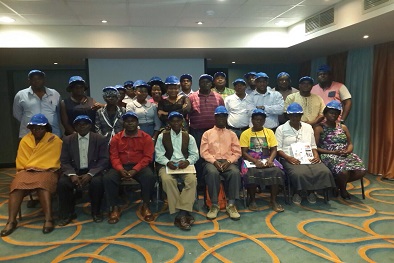The workshops are a part of the ARC/ GWPSA collaboration aimed at further tailoring packaging and dissemination of the research outputs on small water infrastructure project (known as the L2 project). In partnership with ARC, GWP-SA refined Limpopo project research outputs and was contracted to also:
- Disseminate L2 outputs widely in the region, across Africa and globally through their network.
- Target and strengthen engagement with key stakeholders and mandated institutions at all levels to promote L2 research uptake (engagement events between scientists and strategic stakeholders in the four countries and at the basin level through LIMCOM)
The refinement work on the L2 outputs involved extracting key messages from various research reports, and using those messages to produce technical briefs, infograpghics, and guidelines . These key outputs together with all the L2 project outputs were presented at the workshop for discussion.
The workshops provided an opportunity to go back to communities and users, and let people know the original objectives/questions of the research findings and get some understanding of how useful that was. Stakeholders were therefore engaged in conversations about how the information has been useful to them, will be useful to them going forward, and could be/could have been more useful to them.
The L2 research was a compoment of the Challenge Program on Water and Food (CPWF) - a global research-for-development program in river basins such as the Limpopo, Nile, and Volta Basins in Africa, and Mekong, Ganges and Andean. The objective of the CPWF Basin Development challenge in the Limpopo was to improve integrated management of rainwater to improve smallholder productivity and livelihoods and reduce risk.
From 2010 through 2013, the CPWF facilitated five projects in the Limpopo basin, all of which contributed to the intended impact. The five projects were:-Limpopo Project 1 (Target and scaling out), Limpopo Project 2 (Small Water infrastructure), Limpopo Project 3 (Farm systems and risk management), Limpopo Project 4 (Water governance) and Limpopo Project 5 (Learning for innovation and adaptive management). The study was conducted in four countries that shared the Limpopo basin namely; South Africa, Zimbabwe, Botswana and Mozambique.
ARC championed the Limpopo project 2 (L2), a study on the status and performance of small-scale water infrastructure in the Limpopo basin. The study was carried out through detailed participatory approach on selected sites where dysfunctional SWIs exist. Synthesis on causes of failure and success of past interventions related to SWI development was carried out. Rehabilitation guidelines were produced. Suitable rainwater harvesting structures were established in homestead gardens and croplands at selected project sites Additionally, the study explored alternative design approaches of new SWIs that will support multiple use systems, improved livelihood of the rural community, improved food security and nutritional requirements for children and women.
The L2 team under the lead institution, ARC, has made significant contributions to a successful LBDC programme. Stakeholders such as SADC Water, LIMCOM, NEPAD and Land Bank and have expressed their interest over the potential for uptake and impact of L2’s outputs to increase production in the region. Two close-out workshops under the ARC/GWPSA collaboration are expected to be held in April 2015 in Zimbabwe and Botswana.
